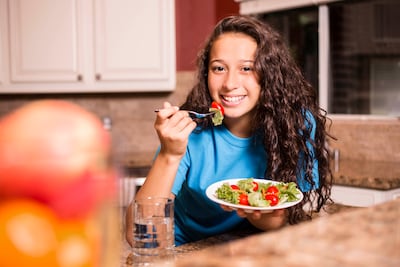One in five children is affected by obesity globally while one in three is overweight, and the disruption owing to the Covid-19 pandemic accelerated these numbers at an alarming rate, according to reports by the United Nations and World Health Organisation.
The US Centres for Disease Control and Prevention, meanwhile, reported in September last year that children gained weight faster during the pandemic compared to before, and that children between the ages of 6 and 11 experienced a BMI increase of 2.5 per cent.
Along with physical changes, children become more independent as they grow. Their diet is one of the first decisions teenagers start to make on their own; however, some young people tend to make poor food choices. This is mainly because they are ill-informed or the information available to them is confusing, overwhelming or based on fads.
Anecdotal evidence suggests most teenagers don’t consume the daily recommended number of vegetables, fruits and whole grains, and they generally have an increased intake of processed foods, as well as foods and drinks that are high in sugar, sodium and saturated fats. As a growing body needs extra nutrients to support bone growth, hormonal changes and organ and tissue development including the brain, it is highly recommended that teens eat a balanced breakfast of slow-release energy foods, drink water throughout the day and limit processed foods and sugary drinks.
Young people’s need for calories and nutrients is crucial for healthy growth and helping them to understand the importance of making smart food choices is essential for this development. If a youngster is able to cultivate a positive relationship with food, it will go a long way in guiding them to become a healthy and self-reliant adult.

Schools need to make obesity prevention a priority because they can reach a vast audience of youth, provide them with regular opportunities to take part in physical activity and offer nutritious foods through school meal programmes.
I firmly believe adults should play a big role in educating young people on healthy living in general. It is our responsibility to teach them about good eating habits and how regular physical activity can help lower the risk of obesity. It is also our responsibility to educate them with facts about nutrition, so they don’t rely on the many myths that are communicated about food.
Here are some important myths we need to bust.
Myth: carbs make you fat
Fact: we see this message communicated online and on social media regularly, but carbohydrates do not make you fat. Not having a balance between food eaten and energy expended, so eating too many calories for an extended period of time and not moving your body enough to balance this out, is what actually makes you gain weight. Carbohydrates are an essential part of our diet and cutting out an entire food group isn’t good for anyone, not least teenagers.
Myth: fats are not good for you
Fact: while trans fats and saturated fats encourage weight gain and heighten cholesterol levels, eating healthy dietary fats such as oily fish, avocado, nuts and seeds is an essential part of a healthy and balanced diet. Healthy fats have endless benefits, including producing important hormones and supporting cell function.
Myth: you need to stop eating at a certain time at night to lose weight
Fact: if you are hungry at any time of the day, you should eat. It is not true that the body holds on to food and makes you put on weight if you eat later in the day. The body and its digestion function does slow down towards the end of the day, which means it can take longer to digest heavy food and big meals in the evening, but it isn’t true that you should avoid food completely after a certain time to lose weight. This links back to the fact that the only way to gain weight is by eating too many calories and not moving your body enough.
To address these and other myths, I have teamed up with the fitness and wellness show Dubai Active, to host a student-only session to help young people understand the power of good food and how to fuel the body the right way. Throughout the hour-long workshop, I’ll also discuss how food insecurity, alcohol consumption, food addiction and other factors influence dietary patterns. Most important of all, I hope to empower young people about food so they feel in control and confident about their choices and their bodies.
Nutrition coach, trainer and Active IQ ambassador Karim Gabriel’s talk is at the Dubai Active event at Dubai World Trade Centre next Friday at 11am and is free for all students aged 15 to 18; email tom.reece@hbg-events.com for more details

